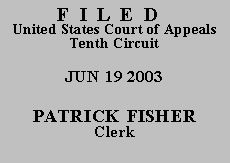

| VINCENTE EMILIO MESA-ECHEVARRIA, |
|
Mr. Mesa-Echevarria, a Cuban citizen, is in the custody of the Immigration and Naturalization Service ("INS") in Colorado. The record indicates that he was paroled into this country in 1980 for emergent and humanitarian reasons. He was convicted in a New York state court of first-degree assault (intentionally causing serious physical injury by means of a sharp instrument) on January 27, 1983, and was sentenced to five to fifteen years imprisonment. The conviction was affirmed by the Appellate Division on September 13, 1984. On July 19, 1995, he was placed in the custody of the INS and was ordered deported based on the conviction. See 8 U.S.C. § 1182(a)(2)(A)(i)(I) (1995) (exclusion based upon crime of moral turpitude).
In his habeas petition and in this appeal, Mr. Mesa-Echevarria contests his now expired state conviction claiming that exculpatory evidence was not submitted to the grand jury or at trial, ineffective assistance of counsel, collusion between the judge and the prosecutor, and lack of due process. We agree with the district court that we lack jurisidiction under § 2241. R. Doc. 3. We note that Mr. Mesa-Echevarria does not contest the fact of his counseled conviction. See Contreras v. Schiltgen, 122 F.3d 30, 32 (9th Cir. 1997), on reh'g, 151 F.3d 906, 907 (9th Cir. 1998) ("[W]e must hold that when a habeas petition [under § 2241] attacks the use of a prior conviction as a basis for INS custody, and the prior sentence has expired, federal habeas review is limited. When the federal proceeding is governed by statutes that limit inquiry to the fact of conviction, there can be no collateral review of the underlying conviction except for Gideon [right to counsel] claims.").
Accordingly, the district court's dismissal of Mr Mesa-Echevarria's habeas petition is AFFIRMED. The motion to proceed in forma pauperis is GRANTED.
Entered for the Court
Paul J. Kelly, Jr.
Circuit Judge
*. This order and judgment is not binding precedent, except under the doctrines of law of the case, res judicata, and collateral estoppel. This court generally disfavors the citation of orders and judgments; nevertheless, an order and judgment may be cited under the terms and conditions of 10th Cir. R. 36.3.
2. After examining the briefs and the appellate record, this three-judge panel has determined unanimously that oral argument would not be of material assistance in the determination of this appeal. See Fed. R. App. P. 34(a); 10th Cir. R. 34.1(G). The case is therefore ordered submitted without oral argument.